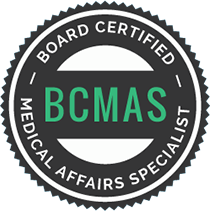What does a Medical Science Liaison (MSL) do?
A medical science liaison (MSL) refers to a field-based medical affairs professional whose primary responsibility is to interact with influential healthcare providers (HCPs) who are on the forefront of their relative therapeutic specialties. Life sciences companies – pharmaceutical, biotechnology, medical devices – all employ medical science liaisons in similar roles.
Companies typically align the medical science liaison role by therapeutic area, such as oncology, cardiology, immunology, etc. Therapeutic area alignment allows medical science liaisons to build relationships with HCPs who specialize in the diseases that the company focuses on.
What qualifications do I need to become a Medical Science Liaison?
Most pharmaceutical companies require you to hold a terminal doctorate degree. For example, a PhD, PharmD, or MD degree. According to the Accreditation Council for Medical Affairs, about 55% of medical science liaisons are pharmacists. Moreover, the number of physicians and PhD professionals is growing rapidly. In addition to a terminal degree, companies also prefer candidates which hold an additional Board Certification in Medical Affairs. Namely, the Board Certified Medical Affairs Specialist Program (BCMAS) is currently the longest standing program around since 2015 with thousands certified in over 75 countries. BCMAS has an excellent reputation and currently has board certified professionals at over 200 companies.
What is the average Medical Science Liaison Salary?
MSL salaries range anywhere from $110,000 to $210,000 depending on your previous experience, degree, qualifications, and whether or not you are working at a large company or a small biotech. The median MSL salary is about $160,000. In addition to a base salary, MSLs will also receive a bonus as well as stock options for publicly traded companies. Depending on the company, the MSL will either receive a company car or a monthly car stipend as well.
What does a typical day for an MSL look like?

One of the appealing aspects to the MSL role is that no two days are the same! MSLs spend the majority of their time on the road visiting physicians thought leaders (also known as key opinion leaders-KOLs) educating them on their company’s products. Below are the most common activities for MSLs:
Field Visits with health care providers where they meet 1-on-1 with Key Opinion Leaders (KOLs)
Attending Medical Conferences where they gather insights and build relationships with healthcare providers
Facilitate Research-MSLs can help companies generate more clinical data on a particular product either through investigator initiated studies (IISs) or Phase IV studies.
Support Data Generation efforts through publication planning. Often times they may work with KOLs who can serve as authors or consultants.
How do I break into an MSL role?
There isn’t much data on success efforts that result in a role other than from the Accreditation Council for Medical Affairs (ACMA) which says that 90% of BCMAS professionals land a MSL role within about 3 months of completing the Board Certified Medical Affairs Specialist Program.

